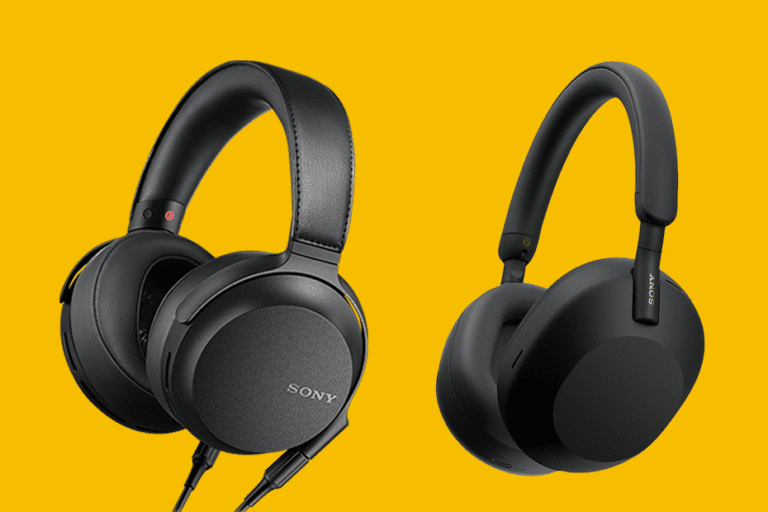Wired or wireless headphones? In a world of technology, headphones have become more than just audio accessories. They’re gateways to musical realms, essential tools for immersive gaming, and partners for long walks outside. As you venture into the realm of headphones, you’re confronted with a pivotal choice: wired or wireless? In this articles, we embark on a journey to learn the differences between these two headphone types.
Before we dive into detail, let’s take a step back to where it all began. Remember those early days of headphones, with wires snaking their way from your ears to the audio source? The tangling, the tugging – a love-hate relationship, indeed. But as technology sprinted forward the wireless headphones entered the stage, and suddenly, we were free from the shackles of cords.

Wired Headphones: Anchored to Tradition
Nostalgia aside, let’s look at the wired headphones. Their design is simple and effective: sound travels from the audio device to your ears through a physical connection. This direct link often translates into impeccable sound quality. When you’re plugged in, the music is rich, the vocals are crisp, and the basslines thump with precision.
However, before you purchase the wired headphones, consider the trade-offs. They might be unbeatable in sound quality, but they’re not exactly known for flexibility. The wires have a mind of their own, tangling when you least expect it. And in a world that’s embracing wireless technology, wired headphones might just find themselves incompatible with certain devices. Smartphones that dared to ditch the audio jack, I’m pointing at you!
Wired headphones pros:
- Superior Sound Quality: Wired headphones are revered for their unparalleled sound quality. The direct connection between the audio source and the headphones ensures minimal loss of audio fidelity, delivering a rich and precise listening experience.
- Reliability: Unlike their wireless counterparts, wired headphones don’t rely on batteries or signal stability. They offer a consistent connection, making them ideal for professional use, such as studio monitoring or gaming where latency can be critical.
- Wide Compatibility: Wired headphones work seamlessly with a wide range of devices, regardless of whether they have a headphone jack or not. Adapters and converters are readily available to adapt to various devices.
Wired headphones cons:
- Limited Mobility: The primary drawback of wired headphones is their limited range of movement. The cord can be cumbersome during activities such as workouts, and it’s prone to tangling, leading to frustration.
- Inconvenience: The need to manage the cord while using wired headphones can be inconvenient, especially in situations where you need to be on the move.
- Device Compatibility: As technology advances, some newer devices, like smartphones, are eliminating the standard headphone jack, making it necessary to use adapters or Bluetooth dongles.
Wireless Headphones: Cutting the Cord for Freedom
The era of wireless headphones ushered in a new era of liberation. The Bluetooth technology unshackled us from cords, letting us groove to our favourite beats without the constant war with cables. And it’s very convenient: you can move freely, dance without restraint, and even take calls with a simple tap.
The charm of wireless headphones lies in their versatility. Whether you’re walking down the street, working out at the gym, or relaxing on your couch, these headphones stay firmly in place. And they also come with features. Touch controls, voice assistants, Active Noise Cancellation (ANC), transparency mode – these modern marvels of technology provide additional control over our auditory experience.

But, there’s a caveat. Wireless headphones come with a battery life tag that requires our attention. With great freedom comes the need for power, and forgetting to charge them can lead to a musical void just when you need it most. And while the audio quality of wireless headphones has drastically improved, they might still slightly bow to their wired counterparts in terms of pure sonic fidelity.
Wireless headphones pros:
- Mobility and Convenience: Wireless headphones offer the freedom to move around without being tethered to a device. This makes them ideal for workouts, commuting, and other activities that require unrestricted movement.
- Advanced Features: Many wireless headphones come with touch controls, built-in voice assistants, and noise-canceling technology, enhancing the overall listening experience.
- Multi-Device Connectivity: Wireless headphones often allow seamless switching between devices, making it easy to transition from listening on your smartphone to taking a call on your laptop.
Wireless headphones cons:
- Battery Life: Wireless headphones rely on built-in batteries, which means they need regular charging. Forgetting to charge them can lead to frustrating interruptions in your listening experience.
- Audio Quality: While wireless technology has improved significantly, some audiophiles might still notice a slight difference in audio quality compared to wired headphones, especially in critical listening scenarios.
- Connectivity Concerns: Wireless headphones can experience connectivity issues, such as dropouts or interference, particularly in crowded areas or environments with multiple electronic devices.
Sound Quality Showdown: Wired or Wireless headphones?
Ah, the battleground of sound quality. Here, the wired headphones stand tall, taking over their direct connection advantage. They transmit uncompressed audio signal without the issues and limitations of wireless transmission, resulting in a more pure sound reproduction. The wired experience hence brings every detail and nuance of your favourite track to light.
Wireless headphones, however, have undergone significant upgrades in recent years. Bluetooth codecs like aptX and LDAC were engineered to preserve audio quality, and while they might not reach the wired headphones sound perfection, they come very close. And for most listeners, the difference in sound between wired and wireless headphones will be negligible in day-to-day scenarios.
Practical Considerations: When Functionality Matters
When it comes to practical considerations, wired headphones thrive in certain arenas. They are a go-to headphone type for professionals – musicians, sound engineers, and gamers. Those, who require real-time audio transmission without the merest hint of delay and sound quality compromise.
Meanwhile, wireless headphones cater to the rhythm of your life. They harmonize with active lifestyles, adding an auditory dimension to your workouts and commutes. Seamless transitions between devices are their specialty, ensuring your tunes never miss a beat, whether you’re on your smartphone, tablet, or laptop.
The Price Tag: Balancing Budget and Quality
The price often serves as the tiebreaker in this wired vs. wireless battle. While audiophile wired headphones can cost hundreds and even thousands of dollars, when we are talking about more affordable products, the wired headphones offer better sound quality for their price. Wireless headphones, on the other hand, incorporate more technology, pushing their price tags slightly higher.
But it’s not just about the money; it’s about the value you seek. Do you desire the highest fidelity, or are you willing to pay a little more for the convenience that wireless headphones provide?
The Future of Headphones: Trends and Innovations
As we glimpse into the future, the landscape of headphones continues to evolve. Wireless connectivity is becoming more reliable, with latency issues inching toward obsolescence. Biometric sensors are stepping onto the stage, turning headphones into health trackers that monitor your heart rate and activity levels. Noise cancellation technology, already impressive, promises even greater immersion into your personal auditory universe.
Conclusions
In conclusion, the choice between wired and wireless headphones boils down to your individual preferences and how you intend to use them. If you prioritize sound quality and reliability, wired headphones might be your best bet. On the other hand, if convenience, mobility, and advanced features are more important, wireless headphones offer a compelling option. Ultimately, both types have their merits and drawbacks, so carefully consider your needs to make the right choice for your audio journey.



